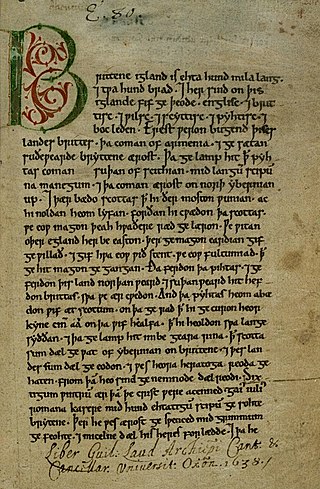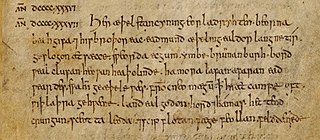Related Research Articles

Æthelred II, known as Æthelred the Unready, was King of the English from 978 to 1013 and again from 1014 until his death in 1016. His epithet comes from the Old English word unræd meaning "poorly advised"; it is a pun on his name, which means "well advised".
Old English literature refers to poetry and prose written in Old English in early medieval England, from the 7th century to the decades after the Norman Conquest of 1066, a period often termed Anglo-Saxon England. The 7th-century work Cædmon's Hymn is often considered as the oldest surviving poem in English, as it appears in an 8th-century copy of Bede's text, the Ecclesiastical History of the English People. Poetry written in the mid 12th century represents some of the latest post-Norman examples of Old English. Adherence to the grammatical rules of Old English is largely inconsistent in 12th-century work, and by the 13th century the grammar and syntax of Old English had almost completely deteriorated, giving way to the much larger Middle English corpus of literature.

Emma of Normandy was a Norman-born noblewoman who became the English, Danish, and Norwegian queen through her marriages to the Anglo-Saxon king Æthelred the Unready and the Danish king Cnut the Great. A daughter of the Norman ruler Richard the Fearless and Gunnor, she was Queen of England during her marriage to King Æthelred from 1002 to 1016, except during a brief interruption in 1013–14 when the Danish king Sweyn Forkbeard occupied the English throne. Æthelred died in 1016, and Emma married Sweyn's son Cnut. As Cnut's wife, she was Queen of England from their marriage in 1017, Queen of Denmark from 1018, and Queen of Norway from 1028 until Cnut died in 1035.

Harold I, also known as Harold Harefoot, was regent of England from 1035 to 1037 and King of the English from 1037 to 1040. Harold's nickname "Harefoot" is first recorded as "Harefoh" or "Harefah" in the twelfth century in the history of Ely Abbey, and according to some late medieval chroniclers it meant that he was "fleet of foot".

Æthelred I was King of Wessex from 865 until his death in 871. He was the fourth of five sons of King Æthelwulf of Wessex, four of whom in turn became king. Æthelred succeeded his elder brother Æthelberht and was followed by his youngest brother, Alfred the Great. Æthelred had two sons, Æthelhelm and Æthelwold, who were passed over for the kingship on their father's death because they were still infants. Alfred was succeeded by his son, Edward the Elder, and Æthelwold unsuccessfully disputed the throne with him.

Cædmon is the earliest English poet whose name is known. A Northumbrian cowherd who cared for the animals at the double monastery of Streonæshalch during the abbacy of St. Hilda, he was originally ignorant of "the art of song" but learned to compose one night in the course of a dream, according to the 8th-century Christian historian and saint Bede. He later became a zealous monk and an accomplished and inspirational Christian poet. He is venerated as a saint in the Eastern Orthodox Church, Roman Catholicism and Anglicanism, with a feast day on 11 February.
Ælfgifu of Northampton was the first wife of Cnut the Great, King of England and Denmark, and mother of Harold Harefoot, King of England. She was regent of Norway from 1030 to 1035.

Edward the Exile, also called Edward Ætheling, was the son of King Edmund Ironside and of Ealdgyth. He spent most of his life in exile in the Kingdom of Hungary following the defeat of his father by Cnut.

Ætheling was an Old English term (æþeling) used in Anglo-Saxon England to designate princes of the royal dynasty who were eligible for the kingship.

Æthelwold or Æthelwald was the younger of two known sons of Æthelred I, King of Wessex from 865 to 871. Æthelwold and his brother Æthelhelm were still infants when their father the king died while fighting a Danish Viking invasion. The throne passed to the king's younger brother Alfred the Great, who carried on the war against the Vikings and won a crucial victory at the Battle of Edington in 878.

The Peterborough Chronicle is a version of the Anglo-Saxon Chronicles originally maintained by the monks of Peterborough Abbey, now in Cambridgeshire. It contains unique information about the history of England and of the English language after the Norman Conquest; according to philologist J. A. W. Bennett, it is the only prose history in English between the Conquest and the later 14th century.

Ælfred Æþeling (c. 1012–1036), was one of the eight sons of the English king Æthelred the Unready. He and his brother Edward the Confessor were sons of Æthelred's second wife Emma of Normandy. King Canute became their stepfather when he married Emma. Ælfred and his brother were caught up in the power struggles at the start and end of Canute's reign.

"The Rime of King William" is an Old English poem that tells the death of William the Conqueror. The Rime was a part of the only entry for the year of 1087 in the "Peterborough Chronicle/Laud Manuscript." In this entry there is a thorough history and account of the life of King William. The entry in its entirety is regarded "as containing the best contemporary estimate of William's achievements and character as seen by a reasonably objective Englishman". As a resource, earlier writers drew from this in a more literal sense, while later historians referred to it more liberally. The text in its original language can be found in The Peterborough Chronicle 1070–1154, edited by Cecily Clark. A modern translation can be found in the Anglo-Saxon Chronicles translated by G.N. Garmonsway. Seth Lerer has published a more recent modern translation of "The Rime of King William" in his article, "Old English and Its Afterlife," in The Cambridge History of Medieval English Literature.
Ecgwynn or Ecgwynna, was the first consort of Edward the Elder, later King of the English, by whom she bore the future King Æthelstan, and a daughter who married Sihtric Cáech, Norse king of Dublin, Ireland, and Northumbria. Almost nothing is known about her background and life. Not even her name is given in any sources until after the Norman Conquest. The first to record it is William of Malmesbury, who presents it in Latinised guise as Egwinna and who is in fact the principal source for her existence.

The Anglo-Saxon Chronicle is a collection of annals in Old English, chronicling the history of the Anglo-Saxons.

Cædmon's Hymn is a short Old English poem attributed to Cædmon, a supposedly illiterate and unmusical cow-herder who was, according to the Northumbrian monk Bede, miraculously empowered to sing in honour of God the Creator. The poem is Cædmon's only known composition.

The "Battle of Brunanburh" is an Old English poem. It is preserved in the Anglo-Saxon Chronicle, a historical record of events in Anglo-Saxon England which was kept from the late ninth to the mid-twelfth century. The poem records the Battle of Brunanburh, a battle fought in 937 between an English army and a combined army of Scots, Vikings, and Britons. The battle resulted in an English victory, celebrated by the poem in style and language like that of traditional Old English battle poetry. The poem is notable because of those traditional elements and has been praised for its authentic tone, but it is also remarkable for its fiercely nationalistic tone, which documents the development of a unified England ruled by the House of Wessex.
Exeter Book Riddle 60 is one of the Old English riddles found in the later tenth-century Exeter Book. The riddle is usually solved as 'reed pen', although such pens were not in use in Anglo-Saxon times, rather being Roman technology; but it can also be understood as 'reed pipe'.
De creatura is an 83-line Latin polystichic poem by the seventh- to eighth-century Anglo-Saxon poet Aldhelm and an important text among Anglo-Saxon riddles. The poem seeks to express the wondrous diversity of creation, usually by drawing vivid contrasts between different natural phenomena, one of which is usually physically higher and more magnificent, and one of which is usually physically lower and more mundane.
The Panther is a 74-line alliterative poem written in the Old English language which uses the image of a panther as an allegory for Christ's death and Resurrection. It is believed to be part of a cycle of three animal-based poems called the Old English Physiologus or Bestiary, a translation-adaptation of the popular Physiologus text found in many European literatures, preserved in the Exeter Book anthology of Old English poetry. Being the first of three poems in the cycle, The Panther is followed by the poems The Whale and The Partridge.
References
- 1 2 3 Thomas A. Bredehoft, ‘Ælfric and Late Old English Verse’, Anglo-Saxon England, 33 (2004), 77–107.
- ↑ Susanne Kries, 'Danish Rivalry and the Mutilation of Alfred in the Eleventh-Century "Chronicle" Poem "The Death of Alfred"', Journal of English and Germanic Philology, 104 (2005), 31-53.
- 1 2 The Anglo-Saxon Minor Poems, ed. by Elliott van Kirk Dobbie, The Anglo-Saxon Poetic Records, 6 (New York: Columbia University Press, 1942).